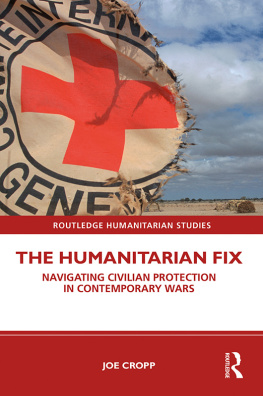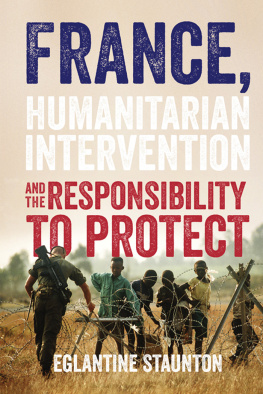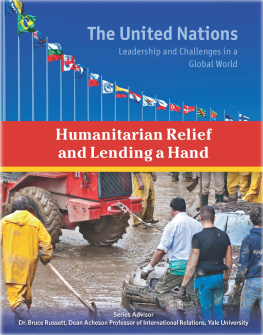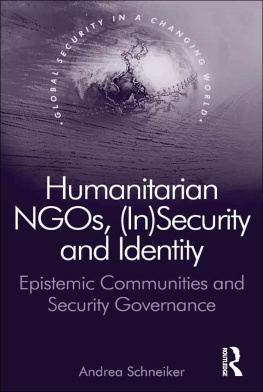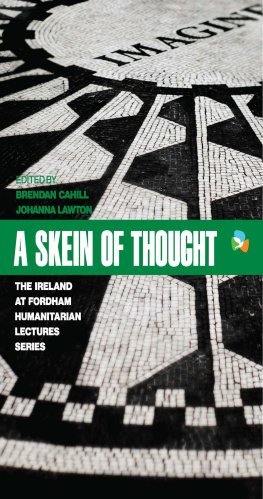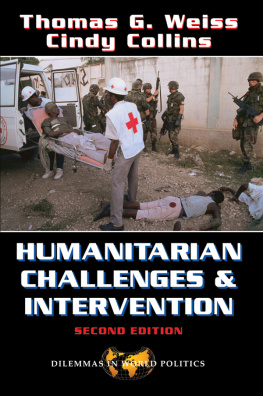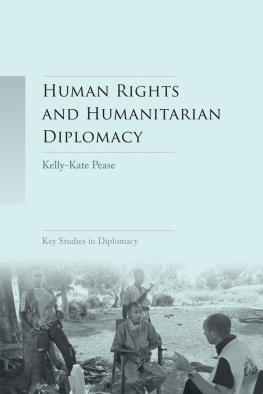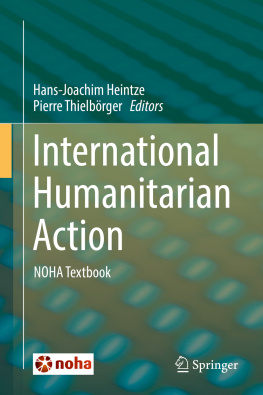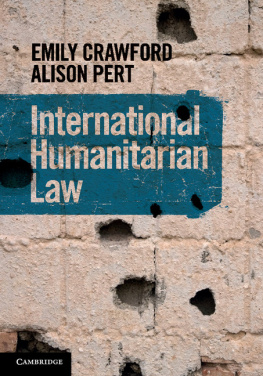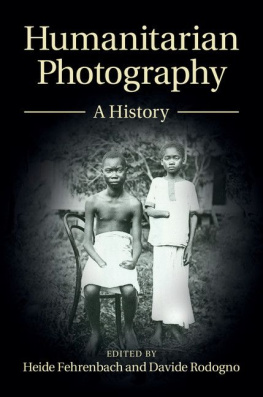The Humanitarian Fix
This book investigates how humanitarians balance the laws and principles of civilian protection with the realities of contemporary warzones, where non-state armed actors assert cultural, political and religious traditions that are often at odds with official frameworks.
This book argues that humanitarian protection on the ground is driven not by official frameworks in the traditional sense, but by the relationships between the complex mix of actors involved in contemporary wars. The frameworks, in turn, act as a unifying narrative that preserves these relationships. As humanitarian practitioners navigate this complex space, they act as unofficial brokers, translating the official frameworks to align with the often-divergent agendas of non-state armed actors. In doing so, they provide an unofficial humanitarian fix for the challenges inherent in applying the official frameworks in contemporary wars.
Drawing on rich ethnographic observations from the authors time in northern Iraq, and complemented by interviews with a range of fieldworkers and humanitarian policy makers and lawyers, this book will be a compelling read for researchers and students within humanitarian and development studies, and to practitioners and policy makers who are grappling with the contradictions this book explores.
Joe Cropp is a delegate with the International Red Cross Red Crescent Movement and a researcher and lecturer in humanitarian and development studies.
Routledge Humanitarian Studies
Series editors: Alex de Waal, Dorothea Hilhorst, Annette Jansen and Mihir Bhatt
Editorial Board: Dennis Dijkzeul, Wendy Fenton, Kirsten Johnson, Julia Streets, Peter Walker
The Routledge Humanitarian Studies series in collaboration with the International Humanitarian Studies Association (IHSA) takes a comprehensive approach to the growing field of expertise that is humanitarian studies. This field is concerned with humanitarian crises caused by natural disaster, conflict or political instability and deals with the study of how humanitarian crises evolve, how they affect people and their institutions and societies, and the responses they trigger.
We invite book proposals that address, amongst other topics, questions of aid delivery, institutional aspects of service provision, the dynamics of rebel wars, state building after war, the international architecture of peacekeeping, the ways in which ordinary people continue to make a living throughout crises, and the effect of crises on gender relations.
This interdisciplinary series draws on and is relevant to a range of disciplines, including development studies, international relations, international law, anthropology, peace and conflict studies, public health and migration studies.
International Humanitarian NGOs and State Relations
Principles, Politics, and Identity
Andrew J. Cunningham
Crisis Management Beyond the Humanitarian-Development Nexus
Edited by Atsushi Hanatani, Oscar A. Gmez and Chigumi Kawaguchi
Urban Poverty in the Wake of Environmental Disaster
Rehabilitation, Resilience and Typhoon Haiyan (Yolanda)
Edited by Maria Ela Atienza, Pauline Eadie and May Tan-Mullins
Disaster Public Health and Older People
Emily Chan
Humanitarianism and the Quantification of Human Needs
Minimal Humanity
Jol Glasman
The Humanitarian Fix
Navigating Civilian Protection in Contemporary Wars
Joe Cropp
First published 2021
by Routledge
2 Park Square, Milton Park, Abingdon, Oxon OX14 4RN
and by Routledge
52 Vanderbilt Avenue, New York, NY 10017
Routledge is an imprint of the Taylor & Francis Group, an informa business
2021 Joe Cropp
The right of Joe Cropp to be identified as author of this work has been asserted by him in accordance with sections 77 and 78 of the Copyright, Designs and Patents Act 1988.
All rights reserved. No part of this book may be reprinted or reproduced or utilised in any form or by any electronic, mechanical, or other means, now known or hereafter invented, including photocopying and recording, or in any information storage or retrieval system, without permission in writing from the publishers.
Trademark notice: Product or corporate names may be trademarks or registered trademarks, and are used only for identification and explanation without intent to infringe.
British Library Cataloguing in Publication Data
A catalogue record for this book is available from the British Library
Library of Congress Cataloging-in-Publication Data
Names: Cropp, Joe, author.
Title: The humanitarian fix : navigating civilian protection in contemporary wars / Joe Cropp.
Description: Milton Park, Abingdon, Oxon ; New York, NY : Routledge, 2021. | Includes bibliographical references and index. | Identifiers: LCCN 2020024919 (print) | LCCN 2020024920 (ebook) | ISBN 9780367440916 (hardback) | ISBN 9781003007500 (ebook)
Subjects: LCSH: Humanitarian law. | Humanitarian intervention. | War (International law)
Classification: LCC KZ6471 .C758 2021 (print) | LCC KZ6471 (ebook) | 341.6/7dc23
LC record available at https://lccn.loc.gov/2020024919
LC ebook record available at https://lccn.loc.gov/2020024920
ISBN: 978-0-367-44091-6 (hbk)
ISBN: 978-1-003-00750-0 (ebk)
Typeset in Baskerville
by Taylor & Francis Books
Contents
PART I
Critical history and theoretical framework
PART II
An ethnography of humanitarian protection
- PART I
Critical history and theoretical framework - PART II
An ethnography of humanitarian protection
Before starting this ethnographic account, it is worth pausing for a moment to identify my position in the research. Personal experiences have motivated this research, are reflected in the questions I set out to answer and colour the methodological approach. In hindsight, the field experience on which this study is based began in 1994, when I was a 25-year-old ex-soldier, aspiring freelance journalist and lost traveller in eastern Zaire. With no idea of the scale of the humanitarian crisis unfolding, I hitchhiked across the border from Uganda to see the camps where some two million refugees had sought safety from the Rwandan genocide. Memories have faded over time, but I still clearly recall my journey from the border, past a growing column of refugees, and that first sight of one of the camps. Set against the magnificent backdrop of an active volcano was a sea of blue tarpaulins extending out to the ends of the valley. In the centre was a small compound of white tents surrounded by wire, more a prison camp than a haven for the refugees. A seemingly endless line of people snaked through the blue tarpaulins and up to the front gate of the compound, now lit up like a sports stadium as night approached. A column of Land Cruisers was leaving for the relative safety of nearby Goma before night set in and militia groups took control.
Staying in a cheap hotel in the town, I spent my days travelling with people involved in the response, under the guise of journalism, sometimes riding in the water trucks as they shuttled between the shores of Lake Kivu and the chaos of the camps, sometimes hitching a ride with an aid convoy as it made the journey from the border with Uganda. I watched from the back seat of a Land Cruiser as the local United Nations fixer handed over cash at each military checkpoint to get relief supplies through the more senior the soldier, the bigger the stack of notes. Listening to the stories of the aid workers and contractors in local hotels at the end of the day, my interest was in the day-to-day, the musings of individuals, which said so much about what was happening. I left Goma by ferry after a few weeks, but there is something about a humanitarian crisis that is addictive. Over the next two years I stumbled through a number of humanitarian crises, including Sudan and the Balkans, visiting camps, following the route of refugees, and hanging out with aid workers and humanitarian contractors. It was these complex emergencies across the 1990s that led the humanitarian community to develop the raft of codes of conduct and professional standards that form part of this research.

